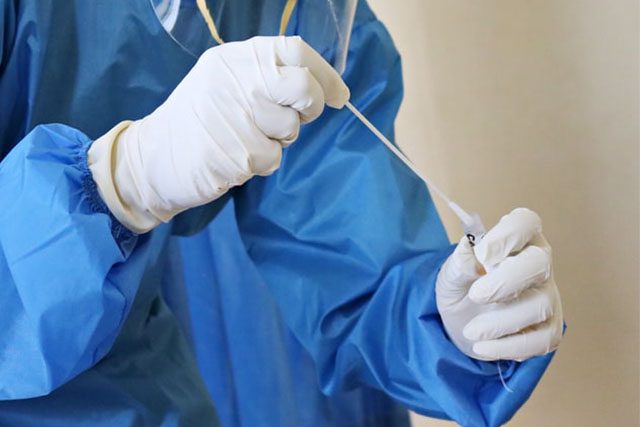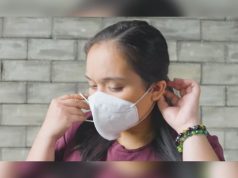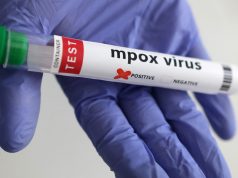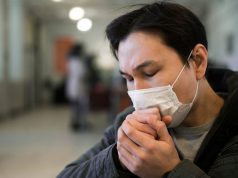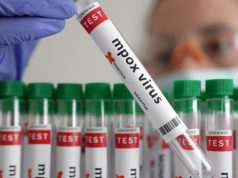Questions were raised after the Department of Health deleted its infographic about the new price caps for real-time reverse transcription polymerase chain reaction (RT-PCR) tests which were imposed to make COVID-19 testing more accessible to the public.
Physician Joey Hernandez on Thursday noticed that the DOH removed its tweet which announced lower price caps for public and private laboratories and home testing services.
On Wednesday, he shared his thoughts about COVID-19 testing and quote tweeted the health agency’s now-deleted post.
“RT-PCR should be subsidized (or at best be free sana). However, in the private sector, the allowed max. price is Php 4,032 (3,362 plus 20% markup). So for those charging more, bawal ‘yan,” Hernandez tweeted on Wednesday in response to the new price caps.
“Sana may strict enforcement of this guideline. Report kung may hindi susunod,” he added.
However, the DOH removed the infographic about price caps a day after.
“Interestingly, DOH deleted the tweet on RT-PCR price cap. Is this an error? Did this make the private hospitals unhappy? Hmmm…” Hernandez tweeted anew.
Statistician Peter Cayton, who is part of the UP COVID-19 Pandemic Response Team, likewise noticed the deletion of the infographic.
“Yes, @DOHgovph deleted the infographic tweet on the price cap. What gives?” he wrote, adding a screenshot of the DOH’s post without the original tweet.
As of this writing, the post only says that it has imposed a price ceiling for home service fees of RT-PCR tests.
It also included a shortened URL that directs to the DOH’s circular dated August 26 which declares the imposition of new price caps.
An excerpt of Circular No. 2021-0374 notes that the information on price cap for RT-PCR testing “should be available for public access to DOH website and other social media platforms.”
“All COVID-19 testing laboratories, health facilities, and centers are to strictly comply with this price cap. Dissemination to all concerned stakeholders is requested,” it reads.
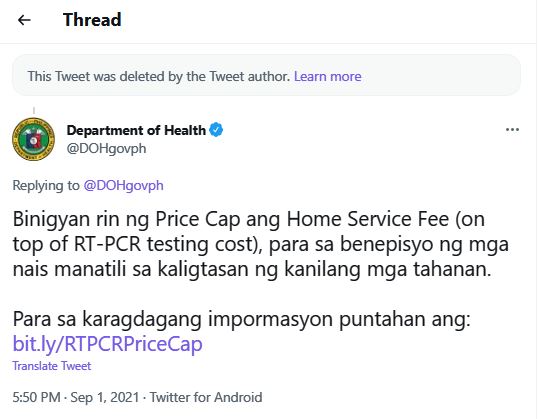
Other online users managed to save pictures of the removed infographic on DOH’s Twitter account.
Ito po ba un? pic.twitter.com/9ckcb85pNG
— choykage (@choykage) September 2, 2021
The circular states that the new price cap for RT-PCR tests are as follows:
- Public laboratories: P2,800 for plate-based and P2,450 for GeneXpert
- Private laboratories: P3,360 for plate-based and P2,940 for GeneXpert
- Home Service: P1,000 for both plate-based and GeneXpert
The new price caps will take effect on September 6.
Based on previous guidelines released last year, RT-PCR tests in public laboratories should not exceed P3,800 while private laboratories should not charge more than P5,000.
Despite the lowered price caps, some rallied for the COVID-19 testing to be free of charge instead.
“This should have been free! This (administration) even has no budget set aside for vaccines. DAMN!” a Twitter user wrote in response to reports of the price range change.
“If (the) government is so proud of their ‘excellent’ pandemic response, then testing should be free like in many other countries,” another online user said, referencing the Palace’s previous remarks on the government’s COVID-19 response.
“DOH giving out new price caps for RT-PCR tests. Better that the test done by private laboratories should be lower. Much better if the tests done by public labs are free,” a different Twitter user wrote.
It was reported that the Philippine Red Cross is also lowering its RT-PCR and saliva tests to 25% of its current cost.
Testing is one of the strategies that the World Health Organization has repeatedly stressed to be a means in slowing down COVID-19 transmission.
“All countries should be able to test all suspected cases, they cannot fight this pandemic blindfolded,” WHO Director General Tedros Adhanom Ghebreyesus said last year.
“You can’t fight a virus if you don’t know where it is. Find, isolate, test and treat every case to break the chains of transmission. Every case we find and treat limits the expansion of the disease,” he said in another press conference.

